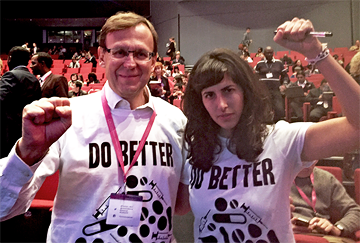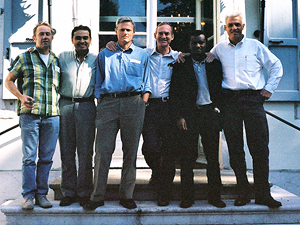Statement from Mark Harrington, Executive Director
on Changing World Health Organization Global TB Program Leadership
 1 December 2017
1 December 2017
“On behalf of TAG, I congratulate Dr. Mario Raviglione on his retirement and thank him for his efforts and the years of collaboration while he was director of the World Health Organization’s (WHO’s) Global TB Program. Though we didn’t always agree, we shared mutual respect and the hope of catalyzing increased research and better programs for people affected by tuberculosis (TB).
Mario started as director of what was then the Stop TB Department at the WHO starting in 2003, and the first years of his tenure were characterized by a more progressive stance from the WHO and optimism in the field. Under Mario’s leadership, the WHO launched the first-ever TB/HIV Collaborative Policies for TB/HIV in 2004 and a TB/HIV operational research agenda in 2006. The WHO showed increasing openness to community involvement by appointing community representatives to the Strategic and Technical Advisory Group for Tuberculosis and guidelines development groups, and by launching the Stop TB Strategy in 2005. This Stop TB Strategy took us out of the dark ages of Directly Observed Treatment Short course (DOTS)-only strategy, which had ignored drug-resistant and smear-negative TB and led (perhaps inadvertently) to the weakening of microbiology laboratories in favor of smear microscopy—for which we are still paying the price today. The Stop TB Partnership set up a community task force and appointed community members to each working group, and TB/HIV targets were included in the Global Plan to Stop TB. Outside of the WHO, the Global Fund was launched, and optimism abounded that TB programs would be scaled up in resource-limited settings.
Yet addressing TB proved more complicated than was thought in the early 2000s. The WHO declared extensively drug-resistant TB an emergency in sub-Saharan Africa in 2007, and the revised Global Plan called for universal drug susceptibility testing (DST). This period was a time of progress, with the advent of a series of new diagnostic tests, including liquid culture—which enabled a recommendation for poor countries to be using culture for the first time, the Capilia speciation test, the first-generation Hain drug-resistance assay, and, probably most importantly, GeneXpert MTB/RIF. There was tremendous hope for scale-up of these new technologies, and the formation of the Global Laboratory Initiative was vital to helping countries rebuild capacity to detect TB properly with a range of tools.
And then the global financial crisis hit, and TB—which was never a quick win like malaria, and never enjoyed the mass community mobilization, political will, or corresponding resources that HIV did—was left behind once again as austerity measures prevailed. This also corresponded to a low point on TB at the WHO. The continuing lack of strong support for preventing TB disease by treating latent TB infection contributed to millions of deaths, which might have been averted had preventive therapy been scaled up (Chaisson and Golub, Lancet Global Health, 2017).
After a push from the community towards more ambitious policies, especially from TAG and partners’ leadership on the Zeroes Campaign for Zero TB Deaths, New Infections, and Suffering, WHO rhetoric improved with the launch of the End TB Strategy in 2015. Noteworthy additions included the pillars of bold interventions, research and innovation, patient-centered care, and foundational principles of human rights and ethics. However, WHO guidance on TB treatment did not always adhere to the highest scientific standards, with the premature recommendation of the shorter regimen for multidrug-resistant TB while clinical trial data were pending (which have since failed to confirm its non-inferiority to the longer regimen) and conservative and confusing guidance on bedaquiline and delamanid, the first two new drugs from new classes approved to treat TB in 50 years.
All told, the progressive policies Mario introduced early in his tenure were laudable, as was his shift to the End TB Strategy. High points included a suite of pivotal TB/HIV guidance documents, the formation of the Global Laboratory Initiative, and the recognition of the importance of a range of diagnostic approaches to improve TB control, as well as the elevation of the need for research in the public discourse. This includes the notable and appreciated focus on research at the recent Ministerial Conference in Moscow, including the launch of the policy paper “Global Investments in Tuberculosis Research and Development: Past, Present, and Future.”
The WHO’s epidemiological approaches have improved greatly over the years, even as they paint an increasingly grim picture of the TB epidemic. The field’s inherent conservatism, which has unfortunately been reflected at the WHO, has held back the adoption of new treatment options. Greater efforts are needed to integrate TB prevention and care more broadly in primary health care systems.
With an estimated 4 million undetected TB cases each year worldwide and stagnation on reducing TB incidence, and with TB having once again become the leading infectious killer globally, there is a lot of unfinished business for the WHO TB program. With unprecedented opportunities to raise high-level political will to fight TB (thanks in part to Mario’s work), leaders in the fight against TB must make sure they seize the political moment provided by the recent Moscow Ministerial Conference and next year’s United Nations General Assembly special session on TB. So while this is an exciting and promising time for TB, it is also a dangerous time. Political leaders need to be convinced that substantial progress against TB is possible in the coming five years.
The WHO’s new leadership must galvanize political will, community, and research and promote scale-up of the interventions that we know work, from preventive therapy to bedaquiline. The BRICS TB research network, launched in Moscow, provides a new framework for new investment by middle-income, high-TB-burdened countries, to accelerate research towards ending TB, and that WHO is well-positioned to help drive and catalyze broader involvement in these efforts by member states.
 TAG welcomes the appointment of Dr. Haileyesus Getahun as acting director of the WHO Global TB Program. I had the pleasure of first working with Haile on the first-ever TB/HIV collaborative policies back in 2003, and I urge him to bring to this role the same spirit of solidarity and ambition he brought to developing those pivotal policies 14 years ago. More than ever, the world needs leadership against TB that is change oriented, promotes equity and innovation, and understands the needs of people living in affected communities. TAG stands ready to work with Haileyesus and his colleagues to move this work forward.”
TAG welcomes the appointment of Dr. Haileyesus Getahun as acting director of the WHO Global TB Program. I had the pleasure of first working with Haile on the first-ever TB/HIV collaborative policies back in 2003, and I urge him to bring to this role the same spirit of solidarity and ambition he brought to developing those pivotal policies 14 years ago. More than ever, the world needs leadership against TB that is change oriented, promotes equity and innovation, and understands the needs of people living in affected communities. TAG stands ready to work with Haileyesus and his colleagues to move this work forward.”
# # #
